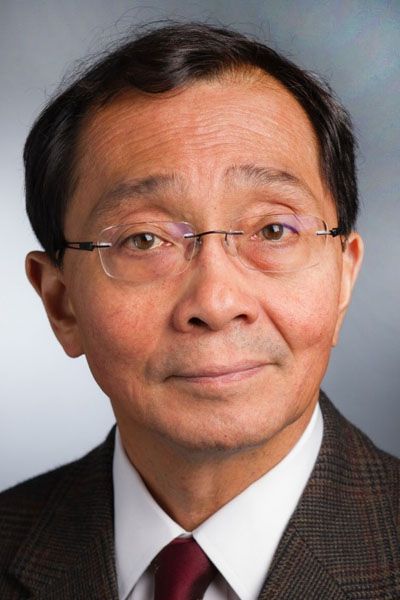GDC-0084 Shows Efficacy for Treatment of Glioblastoma
GDC-0084, an investigational PI3K inhibitor, may delay the progression of disease in patients with newly diagnosed glioblastoma and unmethylated MGMT promotor status, based on results of a phase IIa study, Kazia Therapeutics reported in a press release.
Patrick Y. Wen, MD

Patrick Y. Wen, MD
GDC-0084, an investigational PI3K inhibitor, may delay the progression of disease in patients with newly diagnosed glioblastoma and unmethylated MGMT promotor status, based on results of a phase IIa study, Kazia Therapeutics reported in a press release.1
Patrick Y. Wen, MD, professor of neurology at Harvard Medical School, and the director of the Center for Neuro-Oncology at Dana-Farber Cancer Institute, explained the importance of this research in a statement to the press, saying, “There is an urgent need for new therapies in glioblastoma. GDC-0084 has the potential to be an important new addition to the treatment of this very challenging disease. My colleagues and I look forward to examining further data as the study progresses."
Data presented during the 2019 Society for NeuroOncology Annual Meeting show that in 9 evaluable patients, the median progression-free survival (PFS) was 8.4 months. At the time of data cut-off, 75% of patients were still alive, and the median overall survival (OS) endpoint was not reached as a result. Overall, 47 patients were included in the study.
The toxicities observed in patients treated with GDC-0084 were consistent with other PI3K inhibitors and with prior clinical experience. Most of these toxicities were reversible with proper management. The most common adverse events (AEs) were rash (n = 19), oral mucositis/esophagitis (n = 16), fatigue (n = 15), nausea (n = 14), and hyperglycemia/glucose intolerance (n = 13). There were 15 grade 3 AEs and 2 grade 4 AEs. The oral mucositis and hyperglycemia were considered to be dose-limiting toxicities (DLTs), and the dosage of GDC-0084 was limited to 75mg for patients who experience these DLTs.2
The phase IIa study explored the clinical activity, safety, and tolerability of GDC-0084 using a standard 3+3 design in stage 1 of the study and a 2-arm, open-label design in stage 2. In stage 1 the investigators set out to find the maximum tolerated a dose of GDC-0084 and define the safety profile and whether or not the drug was tolerable in the target patient population.
Expansion cohort patients were analyzed in stage 2 to assess single-agent activity, characterize the safety, tolerability, and pharmacokinetics (PK) of GDC-0084, and to assess the outcomes associated with fed versus fasting. Stage 2 of the study is still ongoing with 20 patients currently enrolled.
Safety and MTD were the primary endpoints of the study. These endpoints had time frames of about 2 years and 1 year, respectively. The secondary endpoints were PK, best OS rate, duration of response, and PFS.
Patients were required to have completed adjuvant radiotherapy for gliomas 12 weeks prior to entering the study. The Karnofsky Performance Status of each patient must have been ≥ 70 at the time of screening. Other inclusion criteria for the overall population of patients were confirmed measurable disease and adequate hematologic function.
Any individuals who had prior treatment with anti-tumor therapy within 4 weeks of the study initiation, any contraindication to MRI examination, evidence of grade ≥ 1 intracranial hemorrhage, active congestive heart failure, a clinically significant history of liver disease, or unresolved toxicity were excluded from the study.
“This is early 'first look' data from the study, representing around a third of the total patients to be enrolled, but it has already exceeded our expectations. We see a clear signal that GDC-0084 is providing clinical benefit in this group of patients. Although it has not yet been possible to calculate overall survival, the fact that the majority of patients in the first stage of the study remain alive more than a year after diagnosis suggests that a meaningful OS benefit may emerge as the study matures. That would be a remarkable finding,’ said Dr. James Garner, chief executive office, Kazia Therapeutics in a statement.
Kazia Therapeutics plans to commence the study in 2020.1
References
- Positive Interim Efficacy Data from GDC-0084 Phase II Study in Glioblastoma Released at SNO Conference [press release]. Sydney, Australia: Kazia Therapeutics; November 25, 2019. https://prn.to/2XZtwcY. Accessed November 27, 2019.
- Wen PY, Grrot J, Battiste JD, et al. Phase 2 study to evaluate the safety, pharmacokinetics, and clinical activity of the PI3K / mTOR inhibitor GDC-0084 given to glioblastoma (GBM) patients with unmethylated O6-methylguanine-methyltransferase (MGMT) promotor status. Presented at the 2019 Society for NeuroOncology Annual Meeting; November 20
FDA Approves FoundationOne CDx as Companion Diagnostic for Tovorafenib in Pediatric Low-Grade Glioma
January 17th 2025FoundationOne CDx is now FDA-approved as the first companion diagnostic for tovorafenib, enabling targeted treatment for relapsed/refractory pediatric low-grade glioma with BRAF mutations or rearrangements.
Read More